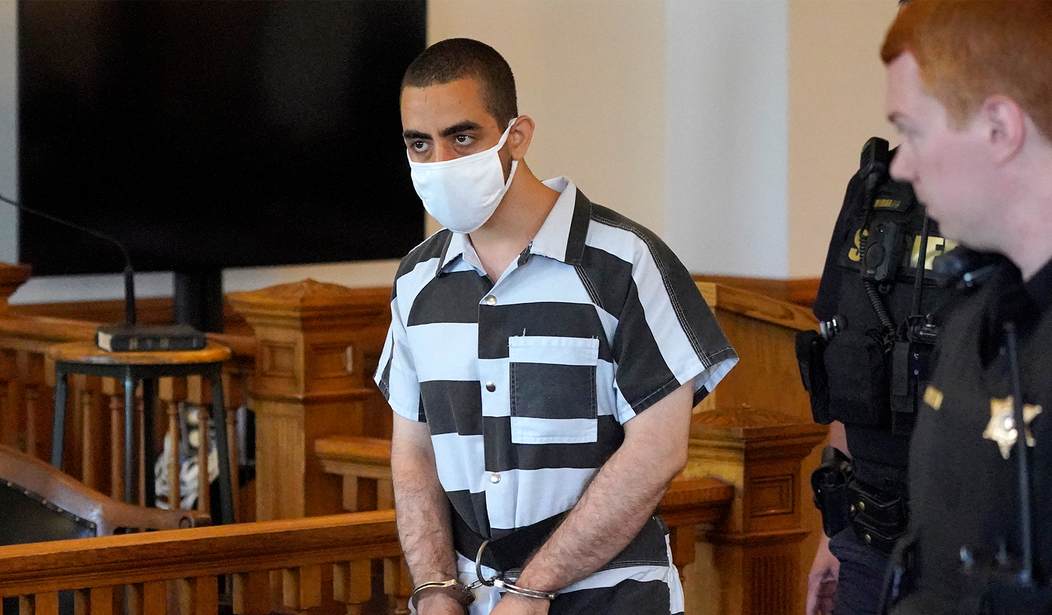When the defendant entered the courtroom, he was dressed respectably in a blue button-down shirt and dark slacks. When his presence was announced, he stood up, said “Good morning,” and gave all present a cheery wave. And thus began one of the most important trials of our age, although everyone involved is doing everything possible to ignore all the reasons why it is so important.
Hadi Matar finally went on trial Tuesday for attempting to murder the novelist Salman Rushdie back in Aug. 2022. There is little, if any, doubt about Matar’s guilt, even though he has pleaded not guilty, for he stabbed Rushdie multiple times in full view of a shocked crowd at the Chautauqua festival. Matar was supposed to have gone on trial in Jan. 2024, but Rushdie wrote a book about the attack, and Matar’s defense attorney, public defender Nathaniel Barone, received a delay in the trial so that he could review the book. It’s hard to fathom how what the victim thought about what happened might affect the guilt of his client, but nevertheless, Barone managed to delay the trial for over a year.
Now that it has begun, both Barone and his opposite number, Chautauqua County District Attorney Jason Schmidt, seem curiously intent on preventing any discussion of Matar’s motive. Matar tried to kill the man who, at the time of the stabbing had carried for 33 years the most famous bounty on his head since the days of the Wild West.
It was on Valentine's Day, Feb. 14, 1989, that Iran’s Ayatollah Khomeini called for Rushdie to be killed for supposedly blaspheming against Muhammad in his novel "The Satanic Verses." By 2022, Iran’s bounty on Rushdie’s head was $3 million. Without Khomeini’s death fatwa on Rushdie, Matar wouldn’t have tried to kill him, and there would be no trial. Nevertheless, neither the prosecution nor the defense wants any talk of that as Matar is tried.
Matar himself was upfront about why he stabbed Rushdie. Back in Aug. 2022, he said: “I respect the ayatollah. I think he’s a great person. That’s as far as I will say about that.” Of Rushdie, Matar said: “I don’t like the person. I don’t think he’s a very good person. I don’t like him. I don’t like him very much. He’s someone who attacked Islam, he attacked their beliefs, the belief systems.” Matar isn’t the most articulate person in the world, but what he said was clear enough to establish that he wanted Rushdie dead in accord with Khomeini’s fatwa.
Schmidt, however, insists all that is irrelevant, saying: “Here, I don’t believe we have to get into issues of Mr. Matar’s religious beliefs, his nationality, and his background to prove an attempted murder charge, which is what we’re doing. The allegation is that Mr. Matar stabbed Mr. Rushdie and stabbed Mr. Reese in an unprovoked attack. Therefore, I think we can prove that without getting into matters that give rise to prejudice of our jury pool.”
Schmidt added: “From my standpoint, this is a localized event. It’s a stabbing event. It’s fairly straightforward. I don’t really see a need to get into motive evidence, whether that’s applicable or not applicable and what that consists of. I’d like to avoid all of that.”
Well, all right, but isn’t examination of motive ordinarily a staple of murder trials? There are numerous reasons for this, including determination of the gravity of the offense, and the likelihood of similar incidents in the future. But Barone is only too happy to leave Matar’s motives out of the trial, as he wanted jurors screened for dislike of Islam. “They’ve talked about the reason why this alleged crime supposedly occurred was because of this book involving Muslims, all that. So it’s kind of like the barn door’s been opened,” Barone said, and he wants that barn door closed.
Related: A Murder in Sweden Shows the Precarious State of Free Speech in Europe
All this is unfolding just days after Salwan Momika, an Iraqi critic of Islam, was murdered in Sweden for burning the Qur’an. The trial of Hadi Matar carries extraordinarily important implications for the future of the freedom of speech and freedom of expression in the West. Will Western countries defend the freedom of speech in connection to criticism of Islam, or abandon it? Hadi Matar blinded Salman Rushdie in one eye and caused permanent damage to one of his arms because of Rushdie’s criticism of Islam, and now at his trial, both attorneys want to pretend that this was some random and inexplicable murder attempt. The implication is that Hadi Matar was right to want Rushdie silenced, and now the attorneys are joining in the silencing.
The trial of Hadi Matar should instead be the occasion for a public discussion of how the freedom of speech and Islam’s death penalty for blasphemy can be compatible — if they can be at all. Instead, Schmidt and Barone have closed the door to any such discussion. One day, however, despite the West’s efforts to avoid it, this issue will be impossible to ignore.










Join the conversation as a VIP Member